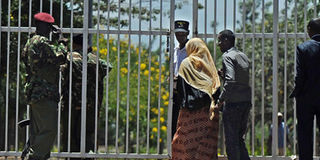A case for liberal policies towards the Somali

A couple are allowed through a security checkpoint as they come to deliver identification documents in a bid to secure the release of a relative being held at the Kasarani football stadium in the Kenyan capital, Nairobi, on April 8, 2014, where people of mainly Somali ethnicity rounded up during a police swoop in the city's Somali district of Eastleigh are being held. AFP PHOTO/ TONY KARUMBA
What you need to know:
- Indiscriminate violence produces an upsurge in support for the state’s opponents.
- The Kenyan security forces need information to be passed to them voluntarily by members of the Somali community.
As the current security crackdown gets ever more indiscriminate, lessons from history and political science should give the government pause for thought about the efficacy of its security policies.
This newspaper and others have published a number of articles over the past two weeks or so criticising the government’s security policies targeted against the country’s Somali community. Mass arrests, deportations and reports of “shoot to kill” orders being given to the police have attracted a backlash from many commentators on moral or legal grounds.
I want to adopt a different approach to this matter and instead comment on the likely effect of current policies; the indiscriminate nature of the security crackdown means it will not make Kenya a safer place.
When looking for historical examples of the disastrous, lasting effects of indiscriminate violence by a state there are few more illustrative than Britain’s actions in Ireland, north and south of the border.
As some readers may be aware, last week witnessed the first state visit by an Irish head of state to Britain. President Michael D Higgins’ visit was reason for celebration by the millions of citizens of Britain and Ireland who enjoy deep, personal and cultural ties.
But it is the fact that it has taken so long for relations between Britain and Ireland to be normalised that is the salient point here; Ireland gained its independence in 1921 and became a republic in 1948.
Despite the fact, in Higgins’ words, Britain and Ireland are ‘deeply interwoven’, political relations between the two countries were poisoned throughout the twentieth century by the effects of the indiscriminate violence of terror and counter-terror. Lives were devastated and communities ripped apart.
The people of both Britain and Ireland learned the hard way that indiscriminate violence is counterproductive. Such violence was perpetrated on all sides of the various conflicts in Ireland involving the British state.
This is not the place for a discussion of Irish republican violence, however. For my purposes today I wish to focus on the indiscriminate violence practiced by the British government’s forces in northern and southern Ireland.
These tactics included imprisonment without trial, the manipulation of the criminal justice system, several massacres by British security forces of unarmed civilians and the use of extra-judicial killings of suspected terrorist leaders.
All of these tactics were justified at the time by the claim that such measures were necessary to counter the very real threat posed by the Irish republican terrorists. But rather than reduce that threat, indiscriminate violence by the British state only consolidated popular support for Irish nationalism.
UPSURGE IN SUPPPORT
This is not surprising. Similar histories can be written of a great many places, including Kenya in the 1950s. Theories of violence built by political scientists using large datasets reach the same conclusion.
In his seminal book The Logic of Violence in Civil War, Stathis Kalyvas, professor of political science at Yale University, makes the convincing argument that indiscriminate violence is counterproductive.
Kalyvas argues that such indiscriminate violence by states is common because of the widespread misapprehension that it will have a deterrent effect; in other words the hope is that indiscriminate violence will convince people not to support an insurgency or rebellion. But invariably the opposite outcome occurs; indiscriminate violence produces an upsurge in support for the state’s opponents.
Kalyvas offers several explanations for this, three of which are particularly persuasive. The first is the moral outrage produced by indiscriminate violence. The second is that indiscriminate violence prevents potential collaborators coming forward: why support the government when you will be punished as if you were an insurgent? Finally, indiscriminate violence increases supports for the government’s opponents as people turn to those opponents as the only viable source of protection from the government.
The only way that a group like Al-Shabaab can be defeated is through intelligence. The Kenyan security forces need information to be passed to them voluntarily by members of the Somali community.
In order for that information to be given voluntarily, the government needs to be able to guarantee informers that they are safe from retribution. Informers will also want to be assured that they will not be caught up in mass arrests, deportations or shot by police officers following “shoot-to-kill” orders.
Policies designed to encourage cooperation are urgently needed. But, as in the United States or Britain at various moments in their histories, the temptation for Kenya’s leaders to be seen to being tough on terrorists seems to be overwhelming.
However, it is much more courageous and will likely be more effective if liberal policies towards the Somali community are adopted, the constitution observed and obligations under international treaties kept.
The Kenyan state needs to start treating Somalis as allies not enemies. It is not too late for Kenya to avoid making the same mistakes as other countries, but time is running out.
Prof Branch teaches History and politics at Warwick University, UK. [email protected]





